英语六年级下册第六单元知识点
六年级下册英语第六单元
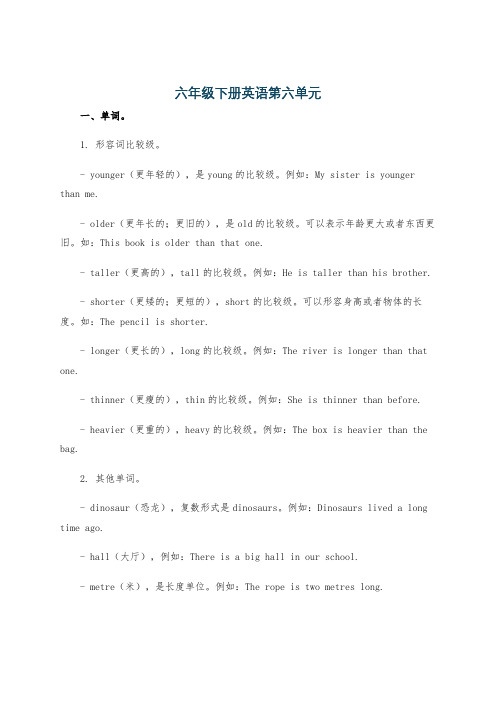
六年级下册英语第六单元一、单词。
1. 形容词比较级。
- younger(更年轻的),是young的比较级。
例如:My sister is younger than me.- older(更年长的;更旧的),是old的比较级。
可以表示年龄更大或者东西更旧。
如:This book is older than that one.- taller(更高的),tall的比较级。
例如:He is taller than his brother.- shorter(更矮的;更短的),short的比较级。
可以形容身高或者物体的长度。
如:The pencil is shorter.- longer(更长的),long的比较级。
例如:The river is longer than that one.- thinner(更瘦的),thin的比较级。
例如:She is thinner than before.- heavier(更重的),heavy的比较级。
例如:The box is heavier than the bag.2. 其他单词。
- dinosaur(恐龙),复数形式是dinosaurs。
例如:Dinosaurs lived a long time ago.- hall(大厅),例如:There is a big hall in our school.- metre(米),是长度单位。
例如:The rope is two metres long.- than(比),用于比较级句子中,连接比较的对象。
例如:I'm taller than you.二、重点句型。
1. 比较级句型。
- A + be动词 + 比较级+ than + B.- 例如:My father is stronger than my mother.(我的爸爸比我的妈妈强壮。
)- Tom's hair is shorter than John's.(汤姆的头发比约翰的短。
英语六年级下册第六单元单词
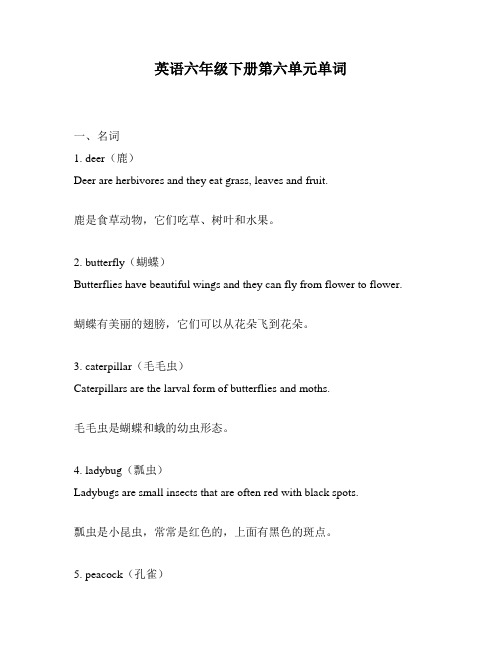
英语六年级下册第六单元单词一、名词1. deer(鹿)Deer are herbivores and they eat grass, leaves and fruit.鹿是食草动物,它们吃草、树叶和水果。
2. butterfly(蝴蝶)Butterflies have beautiful wings and they can fly from flower to flower. 蝴蝶有美丽的翅膀,它们可以从花朵飞到花朵。
3. caterpillar(毛毛虫)Caterpillars are the larval form of butterflies and moths.毛毛虫是蝴蝶和蛾的幼虫形态。
4. ladybug(瓢虫)Ladybugs are small insects that are often red with black spots.瓢虫是小昆虫,常常是红色的,上面有黑色的斑点。
5. peacock(孔雀)Peacocks are known for their beautiful feathers and bright colors.孔雀以美丽的羽毛和鲜艳的颜色而闻名。
二、形容词1. fast(快的)The cheetah is the fastest land mammal.猎豹是陆地上跑得最快的哺乳动物。
2. slow(慢的)Sloths are very slow-moving and spend most of their time hanging upside down in trees.树懒非常缓慢,大部分时间都是倒挂在树上。
3. small(小的)Ladybugs are small insects that can fit on the tip of your finger.瓢虫是小昆虫,可以放在你手指的尖端上。
4. big(大的)Elephants are the biggest land animals in the world.大象是世界上最大的陆地动物。
最新人教版六年级英语下册各单元知识点总结归纳
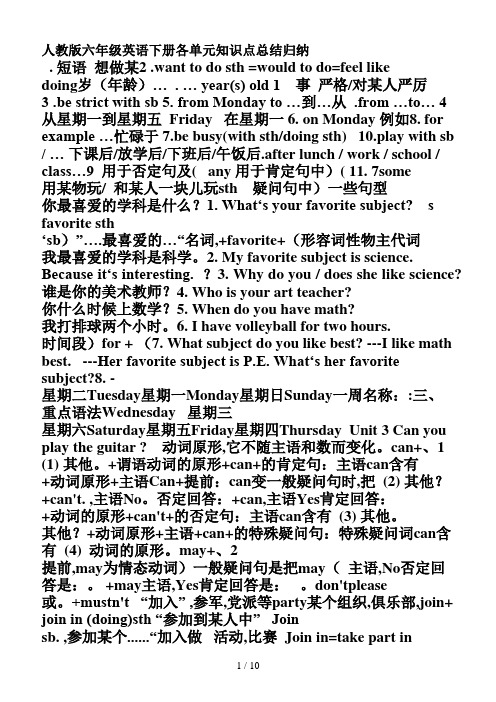
人教版六年级英语下册各单元知识点总结归纳. 短语想做某2 .want to do sth =would to do=feel likedoing岁(年龄)… . … year(s) old 1 事严格/对某人严厉3 .be strict with sb 5. from Monday to ...到...从 .from ...to (4)从星期一到星期五 Friday 在星期一 6. on Monday 例如8. for example …忙碌于 7.be busy(with sth/doing sth) 10.play with sb / … 下课后/放学后/下班后/午饭后.after lunch / work / school / class…9 用于否定句及( any 用于肯定句中)( 11. 7some用某物玩/ 和某人一块儿玩sth 疑问句中)一些句型你最喜爱的学科是什么?1. What‘s your favorite subject? s favorite sth‘sb)”….最喜爱的…“名词,+favorite+(形容词性物主代词我最喜爱的学科是科学。
2. My favorite subject is science. Because it‘s interesting. ?3. Why do you / does she like science? 谁是你的美术教师?4. Who is your art teacher?你什么时候上数学?5. When do you have math?我打排球两个小时。
6. I have volleyball for two hours.时间段)for + (7. What subject do you like best? ---I like math best. ---Her favorite subject is P.E. What‘s her favorite subject?8. -星期二Tuesday星期一Monday星期日Sunday一周名称::三、重点语法Wednesday 星期三星期六Saturday星期五Friday星期四Thursday Unit 3 Can you play the guitar ? 动词原形,它不随主语和数而变化。
新沪教牛津版六年级下册小学英语全册单元知识点小结
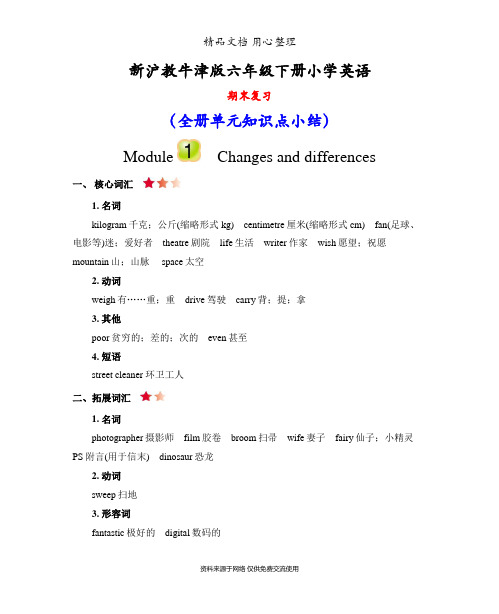
新沪教牛津版六年级下册小学英语期末复习(全册单元知识点小结)Module Changes and differences一、核心词汇1. 名词kilogram千克;公斤(缩略形式kg)centimetre厘米(缩略形式cm)fan(足球、电影等)迷;爱好者theatre剧院life生活writer作家wish愿望;祝愿mountain山;山脉space太空2. 动词weigh有……重;重drive驾驶carry背;提;拿3. 其他poor贫穷的;差的;次的even甚至4. 短语street cleaner 环卫工人二、拓展词汇1. 名词photographer摄影师film胶卷broom扫帚wife妻子fairy仙子;小精灵PS附言(用于信末)dinosaur恐龙2. 动词sweep扫地3. 形容词fantastic极好的digital数码的4. 副词online在线地;在线的5. 代词themselves他们自己;她们自己;它们自己6. 其他taller更高的7. 短语go fishing去钓鱼enjoy oneself玩得愉快;得到乐趣get … in收割street sweeper扫地车by hand用手right away立即;马上in a short time很快head teacher 校长 a piece of一张;一片have a picnic去野餐better and better越来越好三、核心句型1. I’m 150 centimetres tall. 我身高150厘米。
解读:这是介绍身高的句型。
“主语 + be动词 + 数字 + 长度单位(+ tall).”可以用来介绍某人的身高。
举一反三: My cousin is 154 centimetres tall. 我的堂弟身高154厘米。
Jim is 149 centimetres tall. 吉姆身高149厘米。
2. There are a lot of tall buildings in the city. 城市里有很多高大的建筑物。
六年级下册英语第六单元人教版
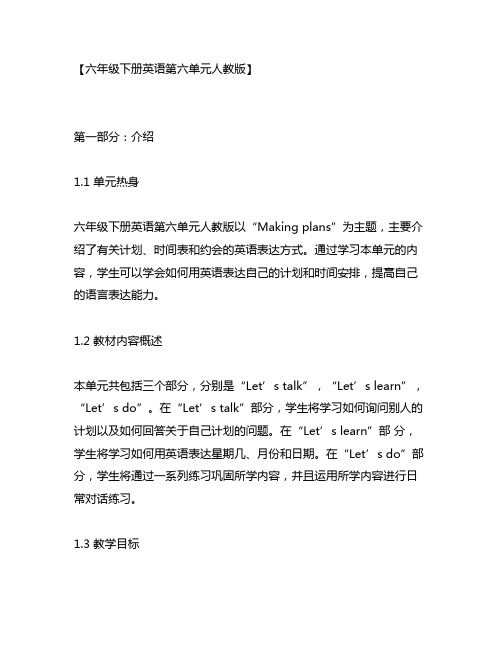
【六年级下册英语第六单元人教版】第一部分:介绍1.1 单元热身六年级下册英语第六单元人教版以“Making plans”为主题,主要介绍了有关计划、时间表和约会的英语表达方式。
通过学习本单元的内容,学生可以学会如何用英语表达自己的计划和时间安排,提高自己的语言表达能力。
1.2 教材内容概述本单元共包括三个部分,分别是“Let’s talk”,“Let’s learn”,“Let’s do”。
在“Let’s talk”部分,学生将学习如何询问别人的计划以及如何回答关于自己计划的问题。
在“Let’s learn”部分,学生将学习如何用英语表达星期几、月份和日期。
在“Let’s do”部分,学生将通过一系列练习巩固所学内容,并且运用所学内容进行日常对话练习。
1.3 教学目标通过本单元的学习,学生将能够掌握以下知识点:a. 熟练使用英语询问别人的计划并做出相应回答;b. 熟练掌握星期几、月份和日期的英语表达方式;c. 能够用所学内容进行简单的日常对话练习。
第二部分:教学具体内容2.1 教学重点本单元的教学重点主要包括:a. 询问别人的计划及做出相应回答;b. 掌握星期几、月份和日期的英语表达方式;c. 运用所学内容进行日常对话练习。
2.2 教学难点本单元的教学难点主要包括:a. 如何用正确的英语表达方式询问别人的计划;b. 如何正确使用英语表达星期几、月份和日期。
第三部分:教学方法3.1 情境教学法通过情境教学法,教师可以创设各种情境,让学生在实际情境中学习新知识,从而更加深刻地理解并掌握所学内容。
3.2 游戏教学法通过游戏教学法,教师可以设计各种趣味游戏,让学生在游戏中不知不觉地学习,提高学生学习英语的兴趣和积极性。
第四部分:课堂教学过程4.1 热身环节在教学开始之前,可以设计一些与本单元主题相关的热身活动,让学生快速进入学习状态。
可以播放一段视瓶,让学生看动画中的人物是如何安排自己的时间的。
4.2 正式学习在教学正式开始后,可以先给学生介绍本单元的主要内容,然后教师可以通过“Let’s talk”部分的课文,引导学生学习如何询问别人的计划以及如何回答关于自己计划的问题。
新译林版英语六年级第二学期第六单元知识点含思维导图

新译林版英语六年级第二学期第六单元知识点含思维导图1. 词汇本单元的词汇主要包括动词、名词、形容词等。
以下是一些重要的词汇及其意义:•Flight(n.):飞行•Journey(n.):旅行•Excited(adj.):兴奋的•Tired(adj.):疲劳的•Story(n.):故事2. 句型本单元学习了一些常用的句型,以下是一些例子:•Where are you going?(你要去哪里?)•I am going to Beijing.(我要去北京。
)•Are you excited?(你兴奋吗?)•Yes, I am excited.(是的,我很兴奋。
)•No, I am tired.(不,我很累。
)3. 文化知识本单元介绍了一些有关飞机的文化知识,下面是一些重要的内容:•飞机是一种先进的交通工具,可以快速飞行到远方城市。
•不同的国家和地区有不同的航空公司,提供各种航班服务。
•飞机经常用来进行国际旅行,可以体验不同的文化和风景。
4. 阅读理解本单元的阅读理解部分包括一些关于旅行和飞行的文章和问题。
学生需要根据文章内容回答问题,提高阅读和理解能力。
下面是一个例子:文章:I am going to fly to London next week. I am very excited.This will be my first flight. I have never been on a plane before.I am a little bit scared, but mostly excited. I can’t wait to see the big city!问题:1.When is the person going to fly to London?2.What is the person’s feeling about the flight?思维导图以下是一个关于本单元知识点的思维导图:思维导图思维导图总结本单元主要学习了与旅行和飞行相关的词汇、句型和文化知识。
(完整)第6-9单元鲁教版六年级下英语重点短语与句型总汇

六年级下英语6-10单元重点短语与句型Unit 6 Don’t eat in class一、重点短语1.in class 在课堂上2.arrive late for class 上课迟到3.on time 准时4.in the hallways 在走廊里5.in the dining hall 在餐厅里6.listen to 听7.at school 在学校8.be late 迟到9.music player 音乐播放器10.bring... to school 把……带到学校来11.have to do 不得不做12.wear a school uniform 穿校服13.go out 外出14.on school nights 在上学期间的晚上15.practice the guitar 练吉他16.do the dishes 清洗餐具17.make breakfast 做早饭18.make one’s bed 整理床铺19.leave sth in... 把......丢在.......里20.read a book 看书21.think about 考虑22.make rules 制订规章23.follow the rules 遵守规章24.Good luck ! 祝好运!25.keep sth+ 形容词使......保持.......状态二、重点句型1. Don't eat in class. 在课堂上不准吃东西。
2. Don't arrive late for class, you must be on time. 不准上课迟到,务必守时。
3. Don’t run is the hallways. 不准在走廊内乱跑。
4. Don’t eat in the classroom. You must in the dining hall.不准在教室里吃东西,务必在餐厅里吃东西。
2020新人教版(PEP)小学英语六年级下册各单元知识点总结
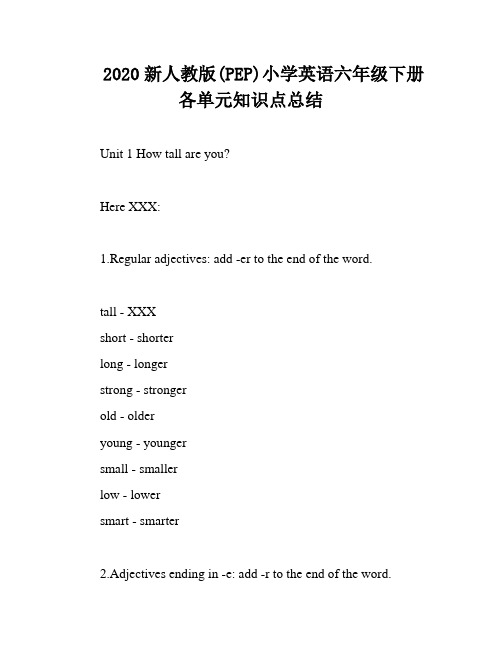
2020新人教版(PEP)小学英语六年级下册各单元知识点总结Unit 1 How tall are you?Here XXX:1.Regular adjectives: add -er to the end of the word.tall - XXXshort - shorterlong - longerstrong - strongerold - olderyoung - youngersmall - smallerlow - lowersmart - smarter2.Adjectives ending in -e: add -r to the end of the word.large - largerlate - latersimple - simplersafe - safer3.Adjectives XXX: double the final consonant and add -er.big - biggerXXX - XXXfat - fattersad - sadderhot - hotterwet - wetter4.Adjectives ending in -y: change the -y to -i and add -er.happy - happierheavy - XXXXXX - funnierangry - angrierXXX - XXXwindy - windierbusy - busierearly - earlierXXX:dinosaur。
hall。
than。
both。
meter。
kilogram。
size。
feet。
wear。
countryside。
shadow。
e.Here XXX:1.Asking about age。
height。
weight。
etc.How old are you?How tall are you?How heavy are you?I am (age) years old。
译林版六年级英语下册各单元知识点归纳

第一单元看图写话基本句型:What do you see in the picture? I can see…基本词汇: stamp, envelope, letterhead, mailbox, post office 句型:I want to send a letter.第二单元商店购物基本句型:How much is / are…? It's / They're … yuan.基本词汇:hat, shirt, skirt, dress, pants, shoes, socks句型:I want to buy a shirt. Do you have any shirts? Yes, we have many in different colors.第三单元交通工具基本句型:How do you go to school / the park? I go to school / the park by bus / bike.基本词汇:bus, bike, car, taxi, subway句型:I go to school by bus.第四单元学校生活基本词汇:get up, have breakfast, go to school, lunch, dinner句型:I get up at 7 o'clock.第五单元四季的特点基本句型:What's the weather like in summer / winter / spring / autumn? It's hot / cold / warm / cool / sunny / rainy.基本词汇:summer, winter, spring, autumn, hot, cold, warm, cool, sunny, rainy句型:It's hot in summer.第六单元动物世界基本句型:What can tigers / monkeys / elephants / pandas do? They can…基本词汇:tiger, monkey, elephant, panda, can, run, jump, swim句型:Tigers can run fast.第七单元人与自然基本句型:What's the matter with you? I have a headache / toothache / fever / cough.基本词汇:headache, toothache, fever, cough, go to the doctor, take medicine句型:I have a fever.第八单元故事阅读基本句型:What happened next / at the end? Next / At the end,…基本词汇:cat, dog, sun, moon, tree, river, jump, run, fly句型:The cat ran away.第九单元城乡生活基本句型:What's the difference between city and village? In the city, there are many tall buildings. In the village, there are many fields.基本词汇:city, village, tall, buildings, fields句型:There are many tall buildings in the city.第十单元性格特征基本句型:W hat kind of person is she / he? She / He is…基本词汇:kind, clever, brave, friendly, helpful, polite句型:She is a kind person.。
沪教牛津版(深圳)英语六年级下册各单元知识点
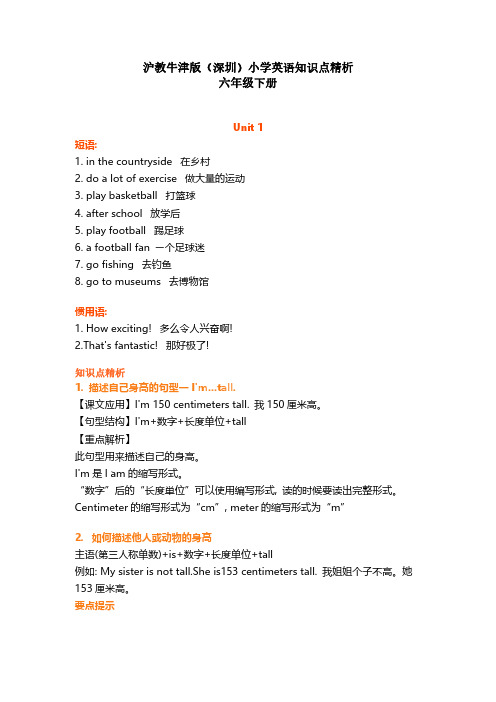
沪教牛津版(深圳)小学英语知识点精析六年级下册Unit1短语:1.in the countryside在乡村2.do a lot of exercise做大量的运动3.play basketball打篮球4.after school放学后5.play football踢足球6.a football fanー个足球迷7.go fishing去钓鱼8.go to museums去博物馆惯用语:1.How exciting!多么令人兴奋啊!2.That's fantastic!那好极了!知识点精析1.描述自己身高的句型一I'm…tall.【课文应用】I'm150centimeters tall.我150厘米高。
【句型结构】I'm+数字+长度单位+tall【重点解析】此句型用来描述自己的身高。
I'm是I am的缩写形式。
“数字”后的“长度単位”可以使用编写形式,读的时候要读出完整形式。
Centimeter的缩写形式为“cm”,meter的缩写形式为“m”2.如何描述他人或动物的身高主语(第三人称单数)+is+数字+长度单位+tall例如:My sister is not tall.She is153centimeters tall.我姐姐个子不高。
她153厘米高。
要点提示在表达身高时,长度单位后面的tall可以省略。
表示身高的长度单位既可以用cm(厘米),也可以用m(米)。
cm应读作/'sentimi:tə/,m应读作/'mi:tə/。
当数字超过“1”时,长度单位要用复数形式,即centimeters/'sentimi:təz/或metres/'mi:təz/,而它们的缩略形式则不用其复数形式。
3.三位数的读法在读三位数时,顺序为“整百数+整十数+个位数”。
整百数和整十数之间用and 连接。
需要注意的是,当三位数中没有十位数时,百位与个位之间的零(0)不读出来,可以直接用and连接百位和个位数字。
(完整版)译林版六年级英语下册各单元知识点归纳

Unit 1 The lion and the mouse 知识汇总一、四会单词rge大的2. strong强壮的3. quietly安静地;小声地4. Weak虚弱的5. loudly 大声地6. happily开心地;高兴地二、三会单词老鼠mouce 复数mice 走过,路过walk by 吵醒,叫醒,弄醒,醒醒wake …up其中一天same day 释放不能,放开let… go 第二天the next day 网net 咬bite 锋利的,尖的sharp难过地,伤心地sadly 就在那时just then 不久,很快soon 从那时起from then on 欢呼cheer 打,击hit 深的deep 够得着reach迅速地,快地quickly 把……倒入pour …into 三、短语积累狮子和老虎 the lion and the mouse mouse: 复数 mice 辨析 mouth嘴巴 month月份又大又强壮large and strong 又小又弱small and weak走过… walk by 走过森林walk by the forest把狮子叫醒 wake the lion up (代词宾格放中间) wake me up 我能在其中一天帮助你I can help you some day 将来不确定的其中一天Some day:安静地说say quietly quiet→quietly 大声地笑道laugh loudly loud→loudly 让狮子走let the mouse go let sb do 第二天the next day用一个大网抓住狮子catch the lion with a large net catch过去式:caught 用他的锋利的牙齿咬网 bite the net with his sharp teeth (tooth) bite过去式: bit 出来get out伤心地问道ask sadly sad→sadly 就在那个时候just then在网里弄了个大洞make a big hole in the net 开心地说say happily happy→happily 从那时起from then on他会说什么? what will he say? 没关系It doesn’t matter.伊索寓言Aesop’s Fables一本中文成语书a Chinese idiom book 开心地打乒乓play table tennis happily 擅长be good at+名词 // be good at +动词ing大声地为他们欢呼 cheer for them loudly cheer for为…欢呼击球用力hit the ball hard hit打,击 (过去式: hit): 最后finally 近意: at last 太深too deep我够不到I can’t reach it reach到达 reach my school 迅速地拿一些水来bring some water quickly 把它倒进洞里pour it in the hole 干得好! Well done!四、四会句子The mouce said quietly. 老鼠小声地说。
外研社(三年级起)英语六年级下册6——10模块知识点汇总
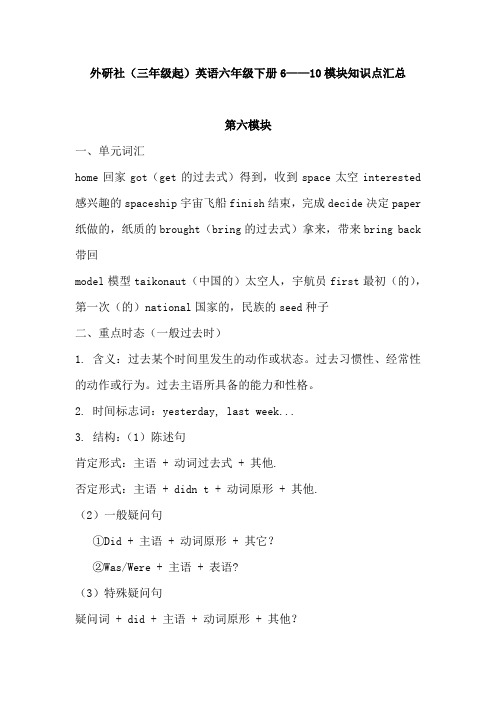
外研社(三年级起)英语六年级下册6——10模块知识点汇总第六模块一、单元词汇home回家got(get的过去式)得到,收到space太空interested 感兴趣的spaceship宇宙飞船finish结束,完成decide决定paper 纸做的,纸质的brought(bring的过去式)拿来,带来bring back 带回model模型taikonaut(中国的)太空人,宇航员first最初(的),第一次(的)national国家的,民族的seed种子二、重点时态(一般过去时)1. 含义:过去某个时间里发生的动作或状态。
过去习惯性、经常性的动作或行为。
过去主语所具备的能力和性格。
2. 时间标志词:yesterday, last week...3. 结构:(1)陈述句肯定形式:主语 + 动词过去式 + 其他.否定形式:主语 + didn t + 动词原形 + 其他.(2)一般疑问句①Did + 主语 + 动词原形 + 其它?②Was/Were + 主语 + 表语?(3)特殊疑问句疑问词 + did + 主语 + 动词原形 + 其他?第七模块一、单元词汇spent(spend的过去式)度过about大约flew(fly的过去式)飞,飞行October十月video录像proud感到自豪的,感到骄傲的someday 有朝一日born出生,诞生as作为became(become的过去式)变成letter字母spell拼写,拼出herself她自己all over到处,遍及,处处live活着role model模范;榜样二、重点句型1. In October 2003, my father flew into space in Shenzhou V.2. He spent about twenty-one hours in space.3. He did a lot of work there.4. My mother and I went to the airport to meet my father.5. I was very proud of him.6. A: Did you go to a zoo?B: No, I didn t.7. A: Did you go to a farm?B:Yes, I did.第八模块一、单元词汇cup杯子planned(plan的过去式)计划baseball棒球more更强烈地smile微笑mistake错误make mistakes犯错误with与......有关said(say的过去式)说raincoat雨衣二、重点句型(一)特殊疑问句(1)含义:以特殊疑问词开头,对句中某一成分提问的句子叫特殊疑问句。
鲁教版六年级下册英语知识点总结

Unit2 重点短语
15.after that 在那之后
Unit2 重点句型
1.-What’s your favorite subject?你最喜欢的 科目是什么?=What subject do you like best? -My favorite subject is science. 我最喜欢的 科目是科学。=I like science best. 2.Her favorite fruit is strawberries.= She likes strawberries best.她最喜欢的水果是 草莓。 3.His favorite day is Sunday.= He likes Sunday best. 他最喜欢星期天。
Unit2 重点句型
11.-What day is it today? -It’s Friday. 12.What date is it today? It’s September 10th. 今天几号? 今天是9月10日。 13.The teacher says it is useful, but I think it is difficult. 老师说它有用,但我认为它很难。 14.It is a useful book. 这是一本有用的书。 15.Lunch is from 12:00 to 1:00. 午餐是12点到1点。
1.-When is your birthday? -My birthday is on May 2nd. 2.-When is your father’s birthday? -His birthday is on April 21st. 3.-Happy birthday! –Thank you, Bill. 4.-How old are you?=What’s your age? -I’m thirteen (years old).
小学六年级下册英语第六单元必背词汇及短语
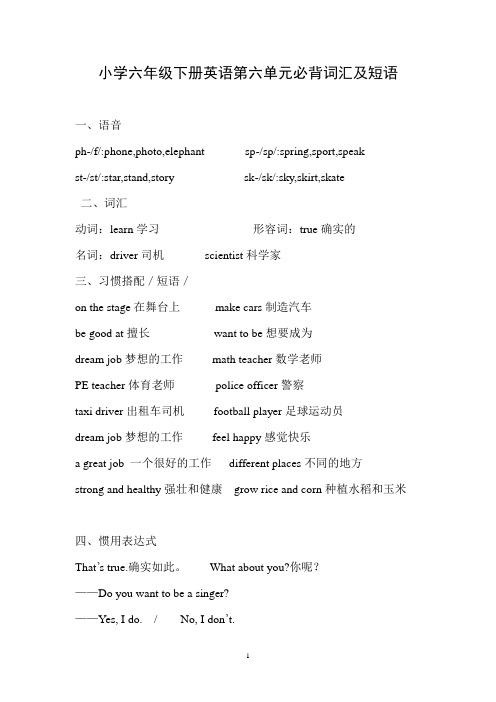
小学六年级下册英语第六单元必背词汇及短语
一、语音
ph-/f/:phone,photo,elephant sp-/sp/:spring,sport,speak
st-/st/:star,stand,story sk-/sk/:sky,skirt,skate
二、词汇
动词:learn学习形容词:true确实的
名词:driver司机scientist科学家
三、习惯搭配/短语/
on the stage在舞台上make cars制造汽车
be good at擅长want to be想要成为
dream job梦想的工作math teacher数学老师
PE teacher体育老师police officer警察
taxi driver出租车司机football player足球运动员
dream job梦想的工作feel happy感觉快乐
a great jo
b 一个很好的工作different places不同的地方
strong and healthy强壮和健康grow rice and corn种植水稻和玉米
四、惯用表达式
That’s true.确实如此。
What about you?你呢?
——Do you want to be a singer?
——Yes, I do. / No, I don’t.
——What do you want to be?
——I want to be an actress.
——Will you be a PE teacher? ——Yes, I will.
(——No, I won’t . I will be a doctor.)。
译林版六年级下册英语各单元知识点汇总
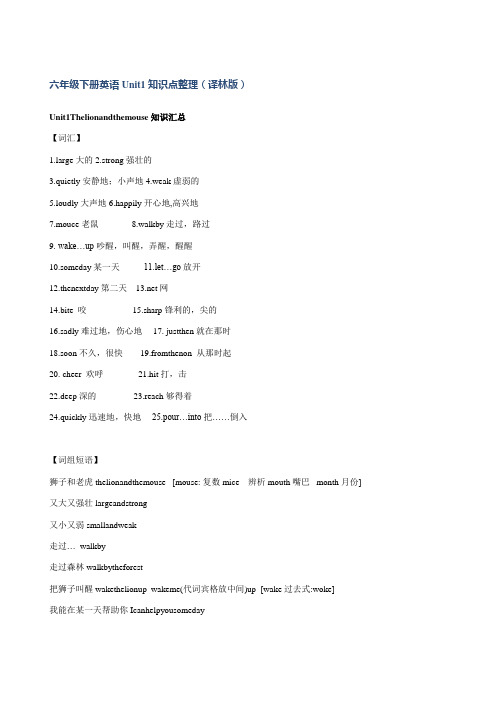
六年级下册英语Unit1知识点整理(译林版)Unit1Thelionandthemouse知识汇总【词汇】rge大的2.strong强壮的3.quietly安静地;小声地4.weak虚弱的5.loudly大声地6.happily开心地,高兴地7.mouce 老鼠 8.walkby走过,路过9. wake…up吵醒,叫醒,弄醒,醒醒10.someday某一天11.let…go放开12.thenextday第二天 网14.bite 咬 15.sharp锋利的,尖的16.sadly难过地,伤心地 17. justthen 就在那时18.soon 不久,很快 19.fromthenon 从那时起20. cheer 欢呼 21.hit打,击22.deep 深的 23.reach够得着24.quickly 迅速地,快地25.pour…into把……倒入【词组短语】狮子和老虎 thelionandthemouse [mouse: 复数 mice 辨析 mouth嘴巴 month月份] 又大又强壮largeandstrong又小又弱smallandweak走过… walkby走过森林walkbytheforest把狮子叫醒 wakethelionup wakeme(代词宾格放中间)up [wake过去式:woke]我能在某一天帮助你Icanhelpyousomeday将来不确定的某一天someday安静地说sayquietly [quiet→quietly]大声地笑道laughloudly [loud→loudly]让狮子走letthemousego [letsbdo,let过去式:let]第二天thenextday用一个大网抓住狮子catchthelionwithalargenet [catch过去式:caught]用他的锋利的牙齿咬网 bitethenetwithhissharpteeth [teeth单数:tooth bite过去式:bit] 出来getout伤心地问道asksadly [sad→sadly]就在那个时候justthen在网里弄了个大洞makeabigholeinthenet开心地说sayhappily [happy→happily]从那时起fromthenon成为好朋友 becomegoodfriends [become+形容词:变得...,变成.... ]糖果店sweetshop一个棒棒糖alollipop他会说什么whatwillhesay没关系Itdoesn’tmatter.伊索寓言Aesop’sFables一本中文成语书aChineseidiombook开心地打乒乓playtabletennishappily擅长begoodat+名词 //begoodat+动词ing大声地为他们欢呼 cheerforthemloudly cheerfor为…欢呼击球用力hittheballhard hit打,击 [过去式:hit]最后finally [近意:atlast]太深toodeep我够不到Ican’treachit [reach到达 reachmyschool]迅速地拿一些水来bringsomewaterquickly把它倒进洞里pouritinthehole干得好!Welldone!【句型】1.Themoucesaidquietly. 老鼠小声地说。
- 1、下载文档前请自行甄别文档内容的完整性,平台不提供额外的编辑、内容补充、找答案等附加服务。
- 2、"仅部分预览"的文档,不可在线预览部分如存在完整性等问题,可反馈申请退款(可完整预览的文档不适用该条件!)。
- 3、如文档侵犯您的权益,请联系客服反馈,我们会尽快为您处理(人工客服工作时间:9:00-18:30)。
Unit 6 I am watching TV 知识点小结及练习题
语法结构
(一)语法讲解:
1.现在进行时的构成与运用。
(1).现在进行时态定义:表示现在正在进行的动作。
(2).现在进行时态构成:助动词be(am,is are) + 动词的现在分词。
助动词Be无实意;它
随着人称、数、时态的变化而变化。
句型:What are you doing ? I’m … .
What’s he /she doing ? He /she is… .
Is he /she doing … ? Yes, he /she isn’t . No , he /she isn’t .
注意:句子中人称数的一致。
例如:I’m eating an apple. What is he/she doing? He/She is playing basketball.
What are they doing? They’re writing .
(3).现在进行时用于以下几种情况:
(A). 现在进行时表示现在正在进行的动作或存在的状态。
I’m doing my homework.我正在写作业。
(B).表示现阶段正在进行,但此刻不一定在进行的动作。
She is translating a novel these days.她最近正在翻译一本小说。
(C).在英语中,有些动词,如:come, go, leave, arrive, begin, start, stay等的现在进行时可表示正在进行的动作,一般跟时间状语,表示不久将要发生的动作。
如:She's coming to see you today.她今天要来看你。
The train is arriving soon.火车就要到了。
I’m leaving for Shanghai tomorrow. 我明天动身去上海. (D). 现在进行时与always, forever等词连用,表示反复出现的或成习惯的动作,
含有“赞叹”, “厌烦”等感情色彩.
He is always thinking of his work.他总是想着他的工作. 2. 动词现在分词的构成规律:
1) 一般情况下,在动词原形后直接加-ing.
如:work-working (工作)/ do-doing(做)/
play-playing(玩)/wear-wearing / meet-meeting/
listen-listening / look-looking / repeat-repeating / watch-watching
2) 以不发音的字母e结尾的动词,去掉e,再加-ing.
如:dance-dancing(跳舞)/ take-taking(带,拿)/ come-coming / have-having
skate-skating / make-making / write-writing
3) 重读闭音节单词,如果末尾只有一个辅音字母,则双写这一字母,再加-ing.
如:put-putting(放)/ stop-stopping(停止)/dig-digging(挖)/ cut-cutting (切,割)/run-running/
swim-swimming/get-getting/ begin-beginning
4) 以ie结尾的动词,把ie 变为y, 再加-ing。
如:die ---dying (死) lie –lying(说谎)
3. 与现在进行时态连用的时间词:now(现在) at this moment(此刻) at present (现在) these days (这些天),当出现下列动词时也可能用进行时,look,listen,
如:What are you doing now? (你在干什么?)I’m reading now. (我现在正在读书。
)
I’m doing much work at present. (我现在做很多事情。
) Look!Mr zhang is singing an English song。
(二)、重点词组
do one’s homework 做家庭作业 watch TV 看电视
eat dinner 吃晚饭 talk on the phone 在电话里交谈
write a letter 写一封信 go to the movies=go to see a film 去看电
play basketball 打篮球 thanks for sth. 为……而感谢
TV|talk show 电视|访谈节目 want to do sth. 想做某事aphoto of my family 一张我的全家照 at the mall “在购物商场”注意用“at”。
talk to: 和…讲话(强调一方在讲另一方在听)talk with: 和…讲话(强调两者都在说,
talk about: 谈论…(强调谈论什么事情) read a book “看书”也可说“read books”
at the pool 在游泳池 at the library 在图书馆
study for 为、、、考试而准备 boat races 船赛
wait for sb./ sth. 等候某人或某物。
eat out 在外面吃
what time =when 询问时间 use the computer 使用电脑
listen to the CD|music 听音乐 make soup|dinner做汤|饭
on Sundays 在每个周日 in the mornings 在每个早上
go to the movies =see a movie 看电影 film|movie 电影
一、选择填空。
() 1. --“ What is she ________?” -- “ She is dancing A. dance B. dancing C. do D. doing
() 2. My sister is _________ homework
A. do
B. does
C. doing
D. making
3. ( ) I am ______ a book. A. see
() They’re ____________ a basketball game. B. looking () What are you _________ at? . C. watching
() What can you _______ in the picture? D. reading
() 4. –What is the man doing? – He’s ________ his clothes.
A. putting on
B. putting
C. wearing
D. dressing
() 5. Look! She ________ music.
A. listen
B. listens
C. listening
D. is listening to
() 6. His family _______ dinner.
A. eats
B. eating
C. is eating
D. are eating
() 7. Here ______ three ______ of his family.
A. is, photo
B. are, photoes
C. are , photos
D. is , photos () 8. Nancy with her friends _________ now.
A. play
B. plays
C.is playing
D. are playing
() 9. Thanks for _______me.
A. ask
B. asks
C. asking
D. to ask
() 10. “ _____ the young woman playing piano?”“ Yes, she _____.”
A. Is, is
B. does , does
C. Is , does
D. does, is
() 11. _______ you want to play tennis?
A. Are
B. Is
C. Do
D. Does
12. ( ) -- _______ is Jenny? -- At the library.
() -- _______ do you want to eat dinner? – At five o’clock.
A. Where
B. When
C. What
D. How
() 13. My parents often talk about ____.
A. Jim and she
B. you and Jim
C. Jim and you
D. he and I () 14. She _______ with her&n
(注:文档可能无法思考全面,请浏览后下载,供参考。
可复制、编制,期待
你的好评与关注)。
